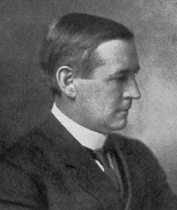
J. Edgar Middleton
Jesse Edgar Middleton was born, November 3rd, 1872, in the township of Pilkington, Wellington County, Ontario. His father, Rev. E. Middleton, is of English birth, and his mother, Margaret Agar, was born and brought up at Newton Brook, near Toronto. The future poet and humourist had the advantage of the Methodist Itinerancy in becoming acquainted with many types of humanity. He was educated at the Strathroy Collegiate Institute, and at Dutton High School. For three years he was a public school teacher, then he entered a publishing house in Cleveland, Ohio, as a proof-reader. After three years of this, he entered Journalism in Quebec city. Later, he came to Toronto as music critic of the 'Mail and Empire,' but since 1904, he has been on the staff of 'The News.' Mr. Middleton is choirmaster of Centennial Methodist Church, and a member of the Mendelssohn Choir. He was married in 1899, to Bessie A. Jackson, of London, Ontario, and has one son. Some excellent war verse from his pen has appeared in his widely-read column, 'On The Side.'—The Editor.
The Colonial
I NEVER saw the cliffs of snow,
The Channel billows tipped with cream,
The swirling tides which ebb and flow
About the Island of my dream.
I never saw the English downs
Upon an April day,
The quiet old Cathedral towns,
The hedgerows white with may.
And still the name of England
Which faithless tyrants scorn
Can thrill my soul. It is to me
A very bugle-horn.
A thousand leagues from Albion's shore
In newer lands I saw the light,
I never heard the cannon's roar,
Nor saw a mark of Britain's might,
Save that my people lived in peace
And blessed the harvest sun,
And thought that tyranny would cease,
And battle-days be done.
And still the flag of England
Was rippling in the breeze
And twice two hundred ships of war
Were surging through the seas.
I heard Polonius declaim
About the new, the golden age,
When Force was but the mark of shame,
When men would curb their hellish rage.
'Beat out your swords to pruning hooks,'
He shouted to the throng,
But I—I read my History-books
And wondered at the song.
For it was glorious England,
The guardian of the free,
Who loosed those foolish tongues—but kept
Her cruisers on the sea.
And liberty was ours to love,
To raise a brood of lusty sons,
To worship Him who reigns above,
And ah!—we never saw the guns,
The search-lights sweeping o'er the sky
The seamen stern and bold,
Our only thought, to live and die,
And comb the earth for gold.
But it was glorious England
Who scanned the threatening morn,
And ah, the very name of her
Is like a bugle-horn!
Off Heligoland
GHOSTLY ships in a ghostly sea,—
Here's to Drake in the Spanish main!—
Hark to the turbines, running free,
Oil-cups full and the orders plain.
Plunging into the misty night,
Surging into the rolling brine,
Never a word, and never a light,—
This for England, that love of mine!
Look! a gleam on the starboard bow,
Here's to the Fighting Temeraire!—
Quartermaster, be ready now,
Two points over, and keep her there.
Ghostly ships—let the foemen grieve.
Yon's the Admiral, tight and trim,
And one more—with an empty sleeve—
Standing a little aft of him!
Slender, young, in a coat of blue,—
Here's to the Agamemnon's pride!—
Out of the mists that long he knew,
Out of the Victory, where he died,
Here, to the battle-front he came.
See, he smiles in his gallant way!
Ghostly ships in a ghostly game,
Roaring guns on a ghostly day!
There in his white silk smalls he stands,—
Here's to Nelson, with three times three!—
Coming out of the misty lands
Far, far over the misty sea.
Now the Foe is a crippled wreck,
Limping out of the deadly fight.
Smiling yond, on the quarterdeck
Stands the Spirit, all silver-bright.
Hell's Half Acre
SIX years of life in the reek of things
Where love is a fay unknown;
A wolfish boy on the crowded street
Who stoops for the cruel stone;
No laughter-light in his infant eyes,
No joy and no baby shame.
'Tis Hell's Half Acre has made him thus
And we are the ones to blame.
Oh, look you well at the rosy lad
Who sits on your knee to-night,
His arms entwining about your neck,
His big round eyes alight.
Oh, list you well to his silver laugh
Which echoes on Heaven's street,
Till the angels smile as they pause to hear
The sound so glad and sweet.
Your boy is filled with the joy of love;
He knows your protecting hand.
It keeps him out of the Lake of Lies
'Mid the hills of Hopeless Land.
And yet his brother, a child of woe,
Is living in black despair
In Hell's Half Acre, and you and I
Are willing to leave him there.
God help the child of a devil's home
With his broken-hearted sigh.
He cringes low in his filthy rags,
A curse for his lullaby.
Six years of life in the reek of things
Where God is an empty name.
'Tis Hell's Half Acre, beside our doors,
And we are the ones to blame.